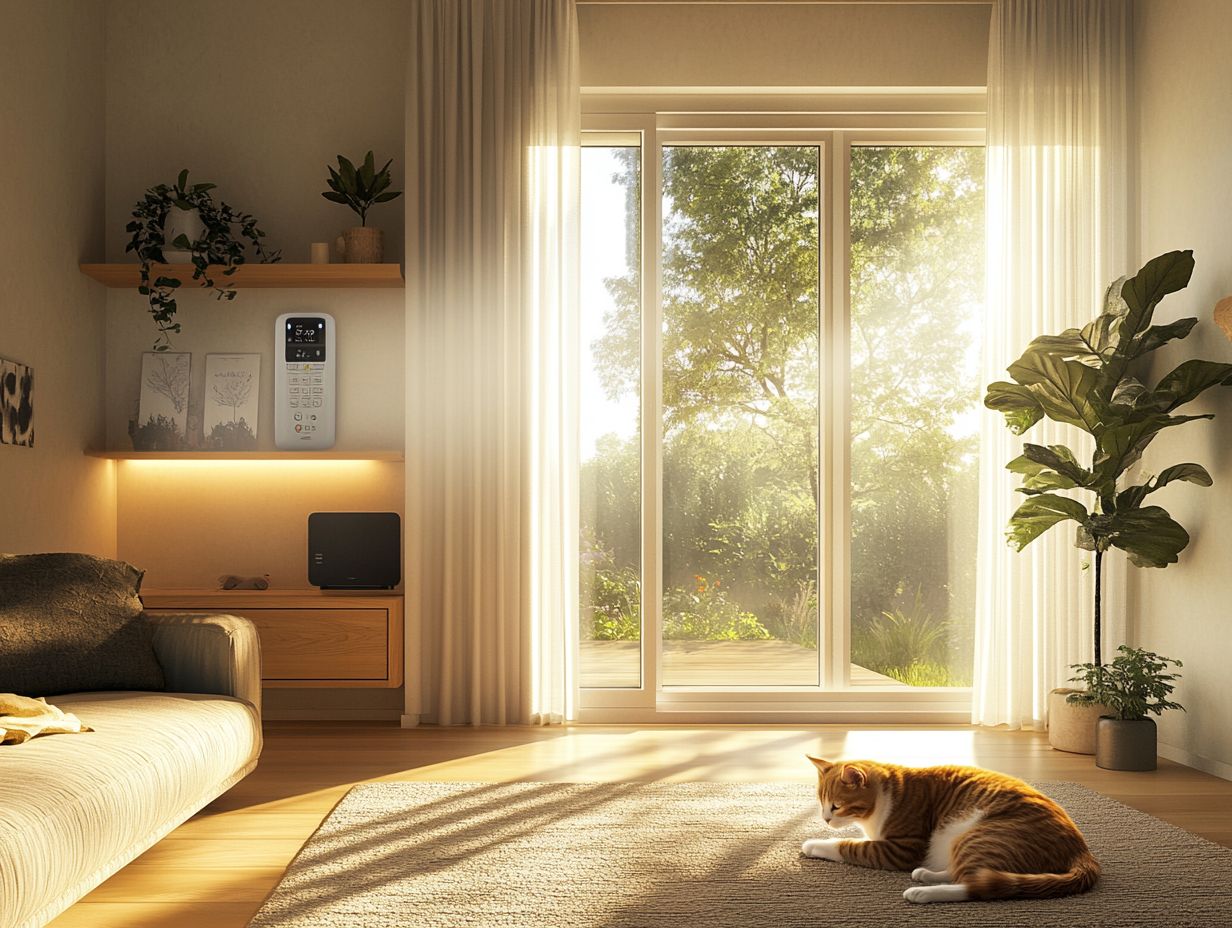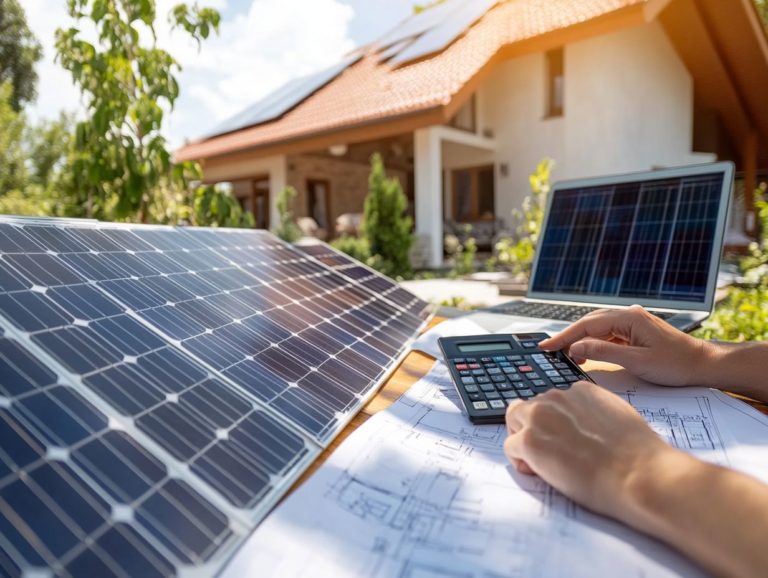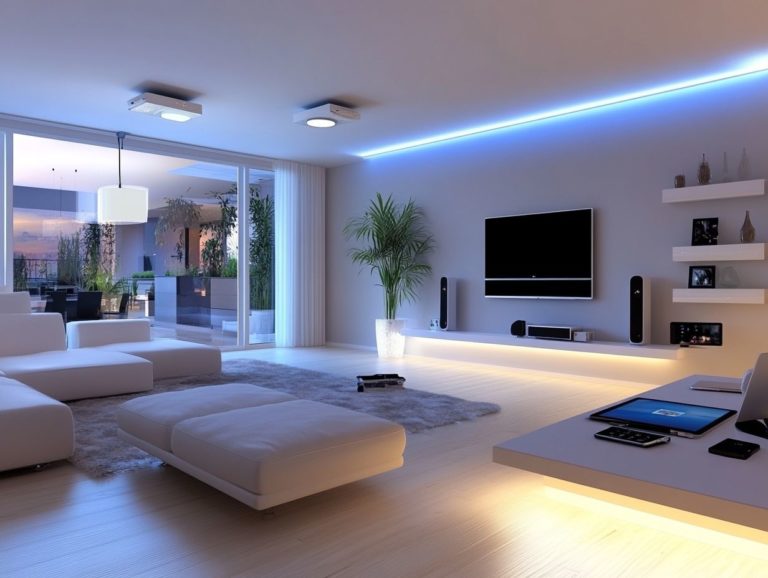How to Make Your Home More Energy Efficient?
Energy efficiency transcends mere buzzword status; it’s a practical strategy that can unlock substantial financial savings while positively impacting the environment.
This article delves into the essence of energy efficiency and its importance in your life. It showcases straightforward changes you can implement at home, from upgrading your lighting to using smart home technology.
It also looks at long-term solutions, such as investing in solar panels.
Are you prepared to transform your living space into an energy-efficient haven? Let s embark on this journey together!
Contents
Key Takeaways:

- Switch to energy-efficient appliances and LED lights to save on electricity bills and help the environment.
- Invest in long-term solutions like solar panels and smart home technology to improve your home’s energy efficiency.
- Focus on key areas like heating and cooling, lighting, and insulation to make the biggest impact on your home’s energy efficiency.
Understanding Energy Efficiency
Understanding energy efficiency is essential for homeowners and energy consumers keen on reducing both their energy consumption and costs. It involves using tools and habits designed to minimize energy waste while enhancing comfort and utility.
By prioritizing energy-efficient appliances, renewable energy solutions, and cultivating smart habits, you can significantly lower your energy bills and lessen your environmental impact.
Energy efficiency also plays a vital role in fostering a sustainable future by conserving precious resources and curbing greenhouse gas emissions. With a wealth of budget-friendly projects at your disposal, every household has the opportunity to take meaningful steps toward greater energy efficiency.
What is Energy Efficiency?
Energy efficiency is about using less energy to accomplish the same tasks, allowing you to reduce both energy consumption and costs.
This principle is essential for keeping those utility bills in check and fostering environmental sustainability. By adopting energy-efficient practices at home, you can significantly reduce greenhouse gas emissions.
This includes a variety of strategies, such as using:
- LED lighting
- Energy-efficient appliances
- Smart home technologies that optimize your energy usage
For instance, programmable thermostats help you manage your heating and cooling more effectively, boosting your comfort while conserving energy. Proper insulation and energy-efficient windows maintain your indoor temperature, significantly cutting down the need for excessive heating or cooling.
With the wide array of energy-efficient technologies available today, you have the power to make choices that benefit both your wallet and the planet.
The Benefits of Making Your Home More Energy Efficient
Transforming your home into a more energy-efficient space brings numerous advantages, from notable financial savings to a commendable environmental impact.
By incorporating upgrades like smart thermostats and ENERGY STAR appliances, which meet strict energy efficiency guidelines set by the U.S. Environmental Protection Agency, you can significantly lower your energy bills. For more information on how to transition to energy-efficient living, embracing energy-saving strategies allows your household to play a vital role in promoting sustainability while boosting comfort levels.
Committing to energy efficiency benefits your budget and contributes to a broader reduction in energy consumption, making a meaningful difference in the world around you.
Financial Savings

One of the most compelling reasons to pursue energy efficiency is the remarkable potential for significant financial savings on your utility bills.
By investing in various energy-efficient upgrades, such as modern HVAC systems and low-flow plumbing fixtures, you can witness a noticeable reduction in energy costs over time. For instance, upgrading to a high-efficiency HVAC unit could slash your heating and cooling expenses by as much as 30%. Installing low-flow toilets and showerheads can save you gallons of water each day, leading to lower water bills.
Simple measures like sealing drafts and adding insulation are budget-friendly projects that not only provide immediate savings but also enhance your home’s overall comfort. Embracing these upgrades benefits the environment and cultivates long-term financial resilience for you and your household.
Start your journey to a more energy-efficient home today! To learn more about the best upgrades, check out this guide on how to upgrade to a smart energy-efficient home. What energy-efficient upgrades have you made at home?
Environmental Impact
The environmental impact of energy efficiency is profound. It plays a vital role in reducing greenhouse gas emissions and conserving precious natural resources.
By embracing energy-efficient practices, you can significantly lower your energy consumption. This decrease reduces reliance on fossil fuels and helps mitigate the adverse effects of climate change.
These practices minimize energy waste and pave the way for a transition to renewable energy solutions like solar and wind power.
The broader implications of adopting such habits extend to national policies and global initiatives focused on achieving sustainability and a cleaner planet.
When communities collectively embrace energy-saving measures, they contribute to a more resilient ecosystem. This supports biodiversity and fosters healthier environments for future generations.
Areas of the Home to Focus On
To truly maximize energy efficiency in your home, concentrate on pivotal areas such as heating and cooling systems, lighting solutions, and the appliances and electronics you use daily.
Heating and Cooling
Heating and cooling systems often rank as the largest energy consumers in a household. They are a vital focus for enhancing energy efficiency.
Upgrading to energy-efficient heating, ventilation, and air conditioning (HVAC) systems and integrating smart thermostats can reduce energy usage significantly. This not only lowers your monthly bills but also contributes meaningfully to environmental sustainability.
These technological advancements offer improved temperature control and adaptive learning. They adjust settings based on your preferences and habits. Regular maintenance is crucial for optimizing performance.
Simple tasks like cleaning or replacing air filters, checking ductwork for leaks, and scheduling professional inspections can make a world of difference.
Implementing zoning systems enhances comfort throughout various areas of your home while minimizing unnecessary energy consumption.
Lighting

Lighting plays a pivotal role in your home’s energy consumption. Shifting to energy-efficient lighting solutions is a savvy decision.
These options help trim your electricity bills and contribute to a more sustainable environment. By opting for LED lights, you enjoy longer-lasting illumination while reducing the frequency of replacements.
Smart lighting systems elevate these advantages even further. They grant you the ability to control your lighting remotely, set timers, and adjust brightness in harmony with natural light levels.
Adopting energy-saving habits like dimming lights when they re not needed or utilizing motion sensors perfectly complements these advanced technologies. This leads to optimal energy usage.
This holistic approach enhances your convenience and promotes eco-friendliness, encouraging a greener lifestyle overall.
Appliances and Electronics
Upgrading to energy-efficient appliances can significantly cut down your energy consumption while delivering the same or even superior performance compared to older models.
By choosing ENERGY STAR certified appliances, you lower your utility bills and contribute meaningfully to environmental sustainability. These advanced models are engineered for optimal energy use, ensuring you don t sacrifice performance whether it’s a refrigerator that keeps your food fresh or a washing machine that provides a thorough clean.
In terms of electronics, adopting simple energy-saving habits can also make a big difference. Unplugging devices when they re not in use and utilizing smart power strips significantly enhance your energy conservation efforts.
Integrating these practices with energy-efficient appliances maximizes your savings and minimizes your carbon footprint.
Simple Changes to Make Your Home More Energy Efficient
You can easily make exciting changes to boost your home’s energy efficiency without the need for hefty investments or extensive renovations.
Replacing Incandescent Bulbs with LED Lights
Replacing incandescent bulbs with LED lights is one of the simplest and most effective ways to boost energy efficiency in your home. This straightforward switch maximizes your electricity use while providing longer lifespans and lower maintenance costs.
Unlike traditional bulbs that burn out quickly, LED lights are engineered to last an impressive 25,000 hours or more. This durability means fewer replacements and less waste, benefiting both the environment and your wallet.
Reducing energy consumption also leads to noticeable savings on your utility bills. Embracing this change is a powerful step toward a sustainable lifestyle while enhancing the quality of light in your space.
Using Energy-Efficient Appliances

Investing in energy-efficient appliances, especially those with the ENERGY STAR label, can yield significant financial returns. These models help lower your utility bills and promote environmental sustainability by reducing harmful air pollution.
If you re considering a kitchen or laundry room upgrade, opt for ENERGY STAR-rated refrigerators, dishwashers, and washing machines for remarkable long-term savings.
When selecting appliances, compare energy consumption ratings aim for products with higher efficiency scores. Also, consider the size and features of each appliance to ensure it meets your needs while maximizing energy efficiency.
By prioritizing ENERGY STAR options, you can enjoy a blend of comfort and cost-effectiveness in your home.
Insulating Your Home
Good insulation keeps your home comfortable all year. It prevents heat from escaping in winter and keeps it out in summer.
To maximize the benefits, consider upgrades like advanced air sealing techniques that target leaks around doors, windows, and other critical areas.
Investing in double-pane windows is another smart move; they significantly reduce energy costs by providing better heat retention than single-pane options.
By optimizing your insulation and sealing measures, you can greatly reduce energy consumption and create a more sustainable living environment, leading to lower utility bills and enhanced comfort.
Long-Term Solutions for Energy Efficiency
For homeowners looking to make strategic, long-term investments in energy efficiency, embracing solutions like solar panels and smart home technology can yield significant rewards.
These innovations enhance your living environment and contribute to substantial savings over time.
Solar Panels
Solar panels offer an exceptional renewable energy solution, allowing you to generate your own electricity while significantly reducing your carbon footprint.
By harnessing the sun’s abundant energy, you can enjoy long-term savings on your electric bills, making it a compelling investment. Many governments provide incentives like tax credits and rebates to encourage the shift to solar power, making it even more attractive.
These solar energy systems provide a reliable energy source and help you minimize dependence on non-renewable resources.
By adopting solar panels, you not only reap financial benefits but also play a vital role in creating a more sustainable environment for future generations.
Smart Home Technology
Smart home technology is transforming energy efficiency. It enables you to monitor and control your energy consumption in real time.
This innovative approach gives you the power to make informed decisions about energy use. It incorporates devices like smart thermostats and intelligent lighting systems.
For example, smart thermostats automatically adjust temperatures based on occupancy patterns. This ensures energy isn t wasted when your home is empty.
Smart lighting systems can mimic natural daylight and adjust according to your schedule. This makes energy-saving habits seamless in your daily routine.
By integrating these technologies, you can significantly reduce your environmental impact while lowering utility bills. You can foster a culture of sustainability in your home!
Frequently Asked Questions
What does it mean to make your home more energy efficient?
Making your home more energy efficient means using less energy while keeping the same comfort. You can learn how to optimize your home’s energy performance with energy-saving appliances and smart habits.
Why is it important to make your home more energy efficient?
Making your home more energy efficient has many benefits. By understanding what an energy-efficient home is, you can lower your energy bills and reduce your impact on the environment for future generations.
How can I tell if my home is energy efficient?
Signs that your home may not be energy efficient include high energy bills and drafty rooms. Inconsistent temperatures throughout the house are also indicators.
What are some simple ways to make my home more energy efficient?
Simple changes like using LED bulbs and sealing air leaks can help. Unplugging appliances when not in use can make a big difference too.
Are there any government programs or incentives to help make my home more energy efficient?
Yes! Many governments offer programs that provide tax credits and rebates for energy-efficient upgrades.
How can I make my home more energy efficient on a budget?
You can install weather stripping and use a clothesline instead of a dryer, all without spending much. When it s time to replace appliances, consider energy-efficient options!
Join the energy-efficient movement now and transform your home into a sustainable haven!






